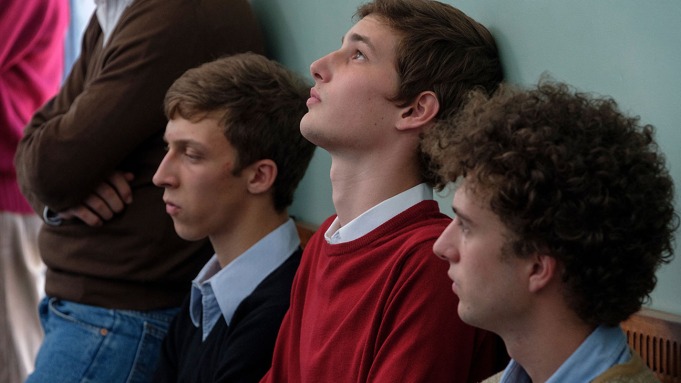(ITALY)
Hollywood Reporter [Los Angeles CA]
September 20, 2021
By Lovia Gyarkye
In Stefano Mordini’s film, based on Edoardo Albinati’s fact-based novel of the same name, a group of young, privileged men commit a disturbing crime.
The story starts like this: A woman hears a noise — it sounds like a cry for help — from her apartment in a tony neighborhood in Rome and calls the police. The uniformed officers arrive and find two teenage girls locked in the trunk of a Fiat 127, their bodies brutally maimed and scarred. One of them, 17-year-old Donatella Colasanti, is shaken but alive; the other, 19-year-old Rosaria Lopez, is dead. Two of their attackers have been found and the other, perhaps tipped off, has fled.
The Circeo massacre, as the rape and murder would come to be known, shook Italian society. It was 1975 and the aggressive crime, committed by three young men who attended San Leone Magno, a prestigious all-boys Catholic high school, was a reminder of the misogyny, classism and fascism festering within the nation. Eduardo Albinati chronicled this harrowing tale in his 2016 novel, The Catholic School. Albinati attended the same school as the accused, and his semi-autographical story uses the crime as a lens for examining the institution’s toxic environment and inherent contradictions. In the film version, which premiered at Venice, Italian director Stefano Mordini translates Albinati’s novel into an uneven and at times distressing cinematic experience.
The film begins with a haunting scene of the beautiful boys of this Catholic school performing exercise drills near a swimming pool — a mesmerizing shot that announces the movie’s beguiling visual language. Through voiceover narration, Edo (Emanuele Maria Di Stefano) introduces the students of this exclusive institution. Although the film need focus on only three of them, The Catholic School indulges in detailing the lives of many of the students, perhaps in an attempt to paint a portrait of the world they inhabited.

Arbus (Giulio Fochetti) is the smartest and the most skeptical when it comes to God and the school. He wants to escape by graduating early. His misanthropy grants him an unmatched level of respect and spares him from bullying, separating him from his classmates. On the other side of the religious spectrum is Gioacchino (Andrea Lintozzi), a quiet boy who grew up in a pious home. Next comes Picchatello (Alessandro Cantalini), a menace whose attractive mother (Jasmine Trinca) is sleeping with his classmate, the effortlessly cool Stefano Jervi (Guido Quaglione).
The boys who will later rape and abuse Donatella (Benedetta Porcaroli) and Rosaria (Federica Torchetti) are, in no special order, Angelo (Luca Vergoni), the one with a scary appetite for violence; Andrea (Giulio Pranno), whose menacing reputation makes him a mysterious and well-respected figure at school; and Gianni (Francesco Cavallo), a lanky, longhaired boy whose tense relationship with his powerful father becomes one of the film’s focus points. Despite their differences in age and temperament, these boys are all governed by the unspoken rules of masculinity. Their beliefs and behaviors are merely attempts to perform what they think it means to be a man. I’d be remiss if I did not mention the strength of the cast. Strong performances from the actors playing the students really hold the film together.
The Catholic School announces itself as a timeline of events before the Circeo massacre, yet its opening sequences feel more like a series of character studies, sketches that reveal how the school and larger community operate. With Edo as our guide, we come to understand, often with a bit of a heavy hand, the secrets, deception and money powering relationships. Mordini looks closely at and sensitively explores the boys’ home lives, using their interactions with their parents and siblings to paint a portrait of a monied community. It becomes increasingly clear that the parents have sent their boys to this institution not for an education, but for refuge. Here, under the guidance of stern administrators, their boys will be safe from terrible influences. Yet the sinister truth is that their sons are the violent ones.
It’s when The Catholic School changes course and begins to focus on Angelo, Andrea and Gianni that it wobbles. The characters we had spent so much time with suddenly seem irrelevant, and the time stamps — which jump around and have no coherent order — make it difficult to follow the basic chronology of events. What drives the boys to commit such a heinous act is not entirely clear either. The film itself starts to feel like two separate projects related only by Edo’s voiceover and cinematographer Luigi Martinucci’s rich, golden visuals.
Of course, there are ways for the film to both psychoanalyze the community and retell this harrowing story, but Mordini’s screenplay, co-written with Massimo Gaudioso and Luca Infascelli, struggles to do so. If the goal were to underscore how the supposed values of this upper-middle-class bunch collapsed, it might have made more sense to begin the film with its ending, and then spend more time on what happened after the girls were found.
The narrative’s women, who seem like the real victims of the community’s unspoken rules and structure, are shortchanged here. While it’s interesting to see how the mothers and sisters of these students navigate a repressive, hyper-masculine society, it’s a shame that Donatella and Rosaria receive very little attention beyond Mordini’s indulgent third act, which focuses on the mechanics of their torture. Considering their outsize impact on Italian society (especially Donatella, who dedicated her life to fighting for justice), this framing not only feels too shallow, but it seemingly reinforces the kind of misogyny The Catholic School seeks to point out.
The Catholic School
THE BOTTOM LINE: A chilling story told in a disjointed manner.
Venue: Venice Film Festival (Out of Competition)
Cast: Benedetta Porcaroli, Giulio Pranno, Emanuele Maria Di Stefano, Giulio Fochetti, Leonardo Ragazzini
Director: Stefano Mordini
Screenwriters: Massimo Gaudioso, Luca Infascelli, Stefano Mordini
1 hour 46 minutes
